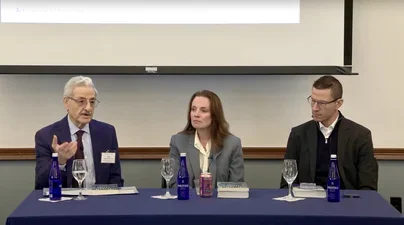In today’s rapidly shifting global landscape, businesses must navigate an increasingly complex web of geopolitical risks—from trade restrictions and regulatory shifts to economic crises and security threats.
On March 4, Columbia University’s School of Professional Studies (SPS) Enterprise Risk Management (ERM) program hosted a discussion on “Geopolitical Risk—Shape the Future: Navigating Uncertainty in a Complex World,” examining how geopolitical risks shape business strategy, financial markets, and energy security.
The panel was moderated by H.S. Bob Kostakopoulos, Ph.D., deputy program director and part-time lecturer in ERM, and featured Adam L. Barbina, geostrategy lead at EY Geostrategic Business Group, and Karen E. Young, senior research scholar at Columbia’s Center on Global Energy Policy and a Columbia graduate with a master’s degree in political science.
“Why geopolitical risk?” Kostakopoulos asked. “We think of it as a risk that exacerbates all other risks—strategic, operational, financial, insurance. It’s about understanding the level of risk and assessing its direction.” He explained that seemingly minor geopolitical shifts, such as export bans, could either have limited effects or signal deeper global tensions.
Young, whose research focuses on government responses to economic crises, emphasized the unpredictability of today’s geopolitical environment. “We are living in a postwar period, but it’s an unsettled time. Don’t assume that anyone has all the answers—because no one does.”

(l-r) H.S. Bob Kostakopoulos, Ph.D., deputy program director and part-time lecturer in ERM; Karen E. Young, senior research scholar at Columbia’s Center on Global Energy Policy; Adam L. Barbina, geostrategy lead at EY Geostrategic Business Group.
Barbina explored geopolitical risk from a corporate strategy perspective, noting that businesses face a growing array of challenges beyond traditional trade concerns. “Geopolitical, country, regulatory, and societal risks—events like elections—supercharge these different risks,” he said. “Companies have to operate within these ever-changing environments.”
While many firms conduct geopolitical risk assessments, Barbina pointed out a critical gap: “Businesses do scans to understand what’s happening in the world, but they often lack a strategy to act on these changes—the goal isn’t to predict specific scenarios but to be prepared with a plan and the ability to execute when needed.”
The discussion also touched on major economic security trends, including the “Fortress America” strategy, in which the U.S. seeks to strengthen domestic manufacturing and reduce reliance on foreign supply chains. However, panelists stressed that such policy shifts require careful sequencing to avoid supply chain disruptions.
Young highlighted how Gulf states, traditionally dependent on oil, are working to diversify their economies in response to geopolitical shifts. Meanwhile, the panelists explored potential “black swan” events—unforeseen, high-impact risks—such as the dissolution of the Organization of the Petroleum Exporting Countries (OPEC) or the growing fragmentation of global economic alliances.
To manage geopolitical risks effectively, companies are embedding risk assessment into boardroom discussions, appointing chief geopolitical risk officers, and engaging in scenario planning. The evolving dynamics among the U.S., China, and Saudi Arabia also present both risks and opportunities, particularly in industries like renewable energy, AI, and manufacturing. The panelists emphasized that businesses must go beyond merely identifying risks; they must develop action plans that allow them to adapt swiftly.
In an era of uncertainty, geopolitical risk isn’t just a background concern—it’s a central factor shaping global business decisions. From regulatory shifts and trade policies to economic security strategies, businesses must remain agile, informed, and prepared to act.
About the Program
The Master of Science in Enterprise Risk Management (ERM) program at Columbia University prepares graduates to inform better risk-reward decisions by providing a complete, robust, and integrated picture of both upside and downside volatility across an entire enterprise.
The final fall 2025 application deadline for the M.S. in Enterprise Risk Management program is May 1, 2025. Learn more here.


